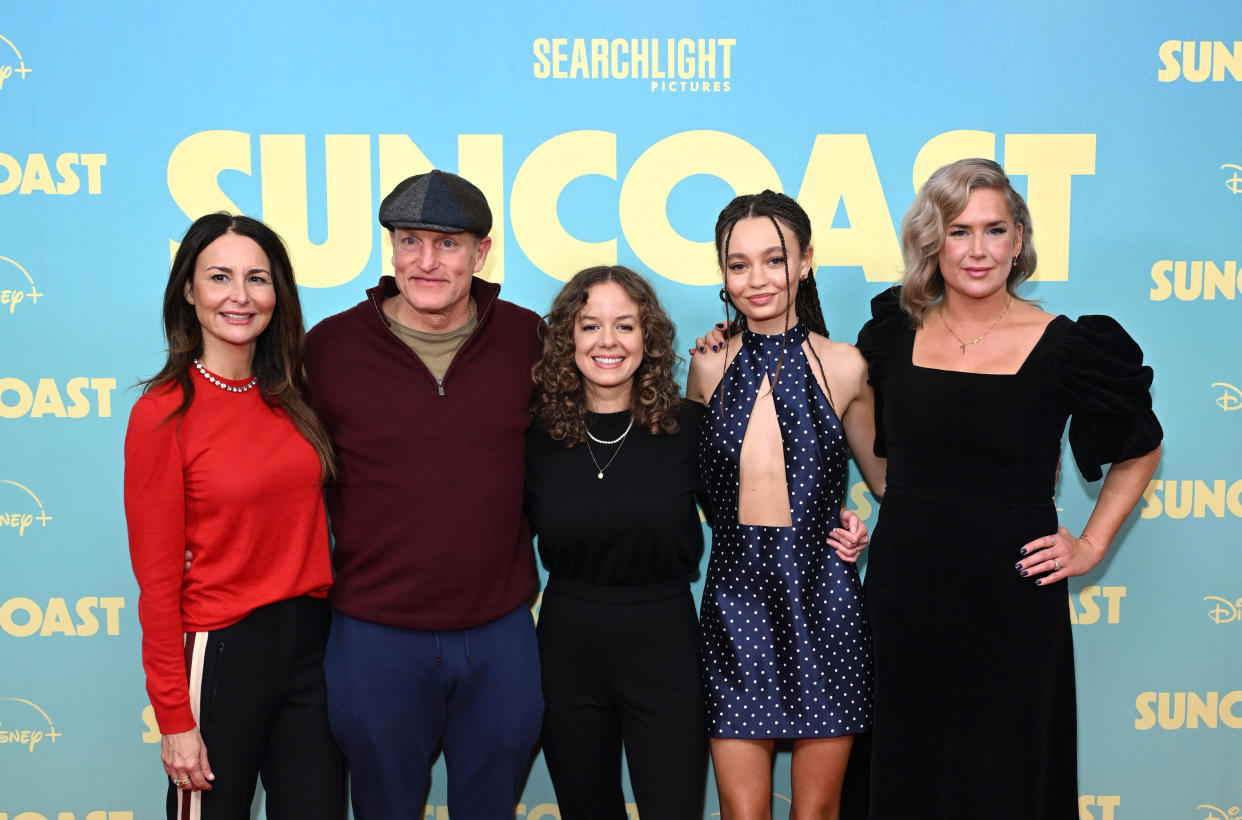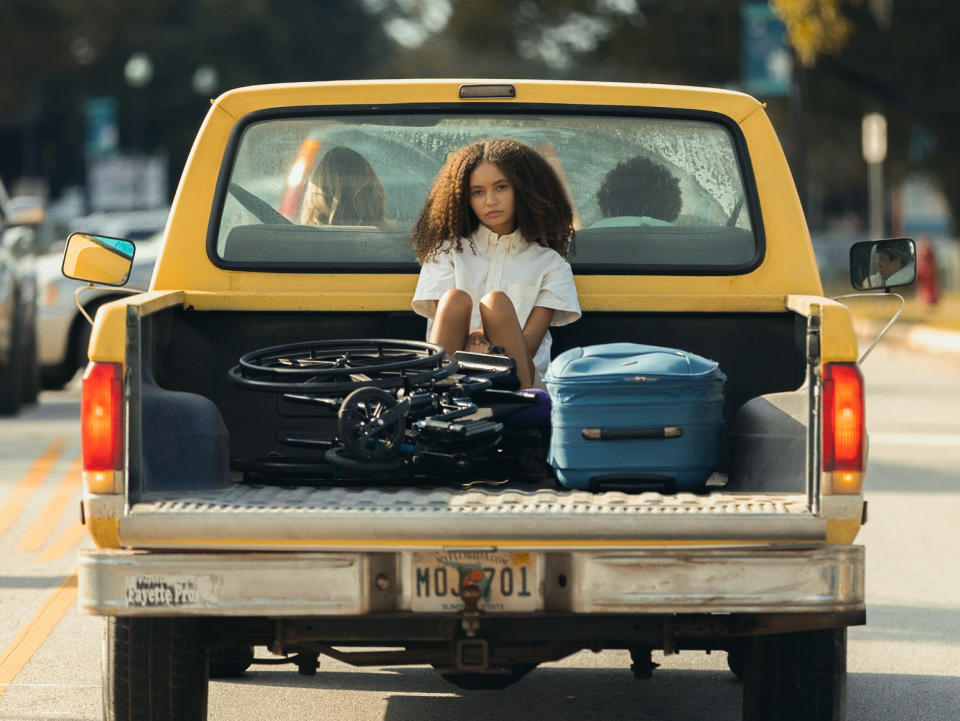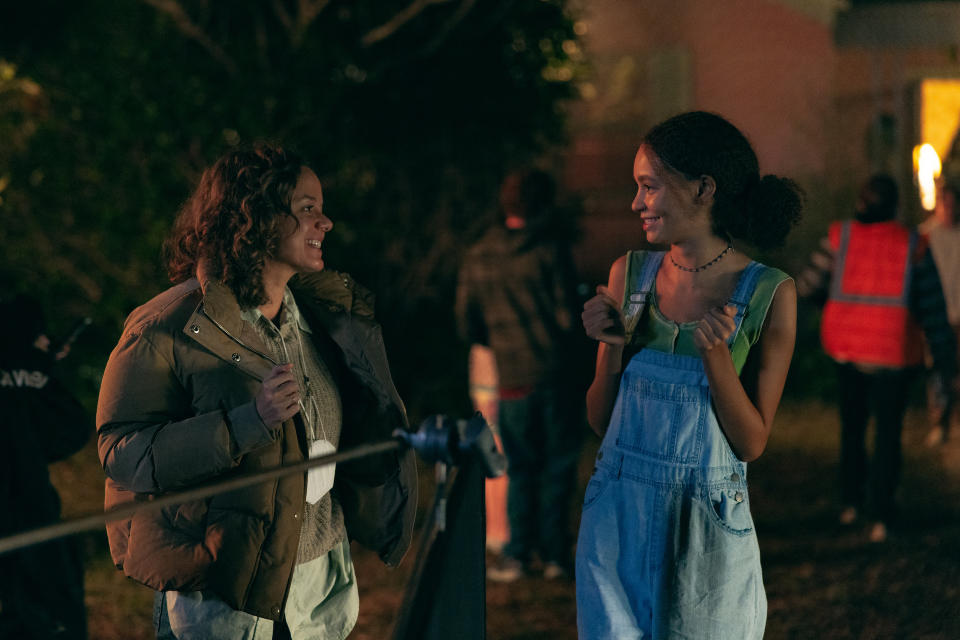The Best Movie About Florida in Years Wasn’t Even Shot There

- Oops!Something went wrong.Please try again later.
- Oops!Something went wrong.Please try again later.
Florida occupies a very specific place in the American cultural psyche at the moment. There’s Florida Man, of course, and DeSantis’ war on a certain mouse, and some eye-popping, color-saturated movies that present the state as a kind of Wild West where anything can happen and transformation is inevitable: “Spring Breakers” and “Zola,” especially. Those films have such a specific, hyper-stylized aesthetic the term “Tampa-core” arose to describe them.
“Suncoast” is not Tampa-core. Even though it’s actually made by a filmmaker from the Tampa Bay area, Laura Chinn, and is set there as well. The Sundance U.S. Dramatic Competition title, now available to watch on Hulu, is the kind of sensitive, heartfelt film you get when you turn your lens on the people who actually live in a tourist destination rather than on those who just visit for a bit and leave.
More from IndieWire
Chinn, who primarily worked as a writer, actor, and showrunner on TV (including on the Pop TV comedy series she created, “Florida Girls”) before making her directorial debut with “Suncoast,” has the kind of deep appreciation for the state that can bust stereotypes.
The funny thing is, the state government itself made it impossible for her to film it there. How’s that for a Florida-sized twist? Let’s back up a bit.
“Suncoast” is, in Chinn’s words, “semi-semi-semi autobiographical.” Like the character played by Nico Parker in the film, Chinn was a teenager growing up in Clearwater dealing with an ongoing family tragedy: Her brother, close to her in age, was terminally ill with brain cancer, and she and her mom moved him into a hospice where, it turns out, national media obsession Terry Schiavo was also receiving long-term treatment. “For years and years I would talk about this and people would make that face,” Chinn said, referring to the expression, at that moment, of the writer of this piece.
For those who need a refresher on what was happening in 2005: Terry Schiavo was a woman in a persistent vegetative state who became an early aughts flashpoint. Her husband, believing she could never recover, wanted her to die with dignity; her parents, clinging to hope of a turnaround, wanted her to live. Even George W. Bush weighed in.
So, like Parker’s character Doris in “Suncoast,” Chinn would visit her brother at the hospice in Clearwater and see, every day, the dozens of protestors out front — most, if not all, advocating for Schiavo to be kept alive, and many aligned with Christian church groups. Woody Harrelson plays one of these faith-based advocates, Paul, who forms a unique friendship with Doris and even, in an amusing sequence, teaches her how to drive. In no way is this a faith-based film, however.
“It’s rare to come to a script that’s so well put together from the very beginning, and we all really just hopped onto it,” producer Kevin Chinoy, who also produced Sean Baker’s “The Florida Project,” said. “Suncoast” appeared on The Black List in 2020, was signed by Searchlight in 2021, and went into production in 2022, a remarkably rapid timeline for a spec script.

But it’s easy to see why, because of characters like Harrelson’s Paul. He’s the one who most clearly exemplifies Chinn’s aim with “Suncoast”: That empathy is the key — to process grief, to understand where other people are coming from, and to debunk stereotypes. In any other film, it’s easy to imagine Paul just being a Jesus Freak. “With Paul, I really wanted people, regardless of politics and wherever they stood on this issue, to see his humanity and to see where everyone’s coming from,” Chinn said. “We need to get ourselves back to a place where we have some understanding. Maybe not the same beliefs. Maybe we’ll never be kumbaya and able to love and embrace everybody, but maybe we can just start to see more humanity in each other. I don’t think we’ll survive otherwise.”
To be clear, “Suncoast” is also a comedy — you have to empathize with a person to laugh with them — and laughter is Chinn’s go-to mechanism for lowering defenses. “I tend to laugh at the most inappropriate things,” she said. “I get through the hardest moments of my life crying with laughter. It’s always been a coping mechanism for me. It’s how I developed my personality — my personality is a coping mechanism.”
“I think there’s just something fascinating — it tugs at my heart, anyway — about when people are confronted with threatening, traumatic experiences,” said Laura Linney, who plays Doris’ mom, Kristine. “When they can see it coming. When they know it’s inevitable, when it’s infiltrated their lives to such a degree, how do you survive? How do you do that? How do you try not to take away the benefits of another child’s life who’s in the family? And comedy is so often a survival technique. I think all of us have probably been in situations that are so surreal, when there’s such craziness going on that’s so serious around you, that the only thing you can do is laugh.”
Chinn wanted to make sure “Suncoast” ended up as “a movie you’d want to see again, because we all know those movies that are beautiful and amazing, but you can never do it again.” Key to that is Parker, 17 when the movie was filmed (and British but doing an American accent). She had to find a character who was sensitive but never maudlin, capable of handling very serious scenes with her mother and brother, and funny moments with Harrelson’s Paul and a cast of young actors playing her high school classmates.
“I thought they were so sweet,” Parker said of the characters played by Ella Anderson, Daniella Taylor, Amarr, and actual Florida-born actress and influencer Ariel Martin, all of whom provide comedy by being so unable to process what Doris is going through that they can’t even come close to find comforting language for her. “There’s a real gentle quality in their obliviousness.”
Doris’ inner friend circle — which she’s certainly part of, though Parker conveys also a sense of being an outsider looking in, as someone who’s had to mature a lot faster but still wants to be a teenager — provides a lot of the comedy in the movie. And they also offer up the period details anyone in high school around 2004/2005 will appreciate: They sing along to Christina Milian’s “Dip It Low” and the Pussycat Dolls’ “Dontcha” — chosen with stunning accuracy by music supervisor Mary Ramos — and do so with such gusto you forget these actors were infants when these songs came out.
“She’d tell me stories about her growing up that would make me die laughing,” Parker said of her director.
“I grew up glow sticking,” Chinn said. “I could glow stick before I could walk. And none of these kids party! They had never been to a nightclub before, like the nightclub in the movie. And I was like, ‘I’m corrupting the youth.’ Florida was lawless [in 2005]. I mean, at least with the friends I grew up with, it was lawless. The kids are so much better than we were today. They’re such better people. It’s alarming.” Even in Florida!
Ah yes, all roads lead back to the Sunshine State. Though not for film productions if the state government could have its way. In July 2023, Tallahassee shuttered the state’s Office of Film and Entertainment, following the end of any state-sponsored tax incentives for film productions. There are still local incentive programs on the county-level (Tom Cruise even filmed some LED wall shots at a studio in St. Petersburg for “Mission: Impossible — Dead Reckoning Part One”), but no state-level film authority to act as a central point of contact to lure productions to the state.
Instead, it’s patchwork and piecemeal. Members of the legislature have said that the financial return on state incentives wasn’t enough to justify the program, though film productions have a demonstrated track record of pumping money into local economies.
“I film now in Savannah and Charleston and these cities have huge economies because of filmmaking,” Chinn said. Aside from three days of filming exterior shots in Clearwater, “Suncoast” was filmed almost entirely in Charleston.

“I was really devastated when we wouldn’t get a tax credit in Florida,” Chinn said. “I was really sad because I think it’s hard to capture Florida elsewhere. The dolphin mailboxes! Little things like that you can’t find elsewhere.” Luckily, she found a house in South Carolina to film that was self-consciously designed to look like a Florida home by its owners. And her attention to detail (a Bay News 9 newsvan!) ensured that it would feel more Floridian than some of those more touristic films that actually were shot in Florida.
There’s love in those details.
“I find Florida to just be a microcosm of the entire country. All the news stories that come out of Florida come out of every state,” Chinn said. “But it’s just like there’s more of them in Florida. Not to mention, Miami is so different from Orlando. Orlando’s so different from Jacksonville. And that’s so different than the middle of Florida, which is very small town. It feels like all of America is stuck there. It’s all of America crammed into one state. It’s like we’re trying to contain all of that energy in one place.”
“Suncoast” is trying to contain a lot too. It’s very funny, yet Chinn invokes Hou Hsiao-hsien’s “The Time to Live and the Time to Die,” a movie which no one would say is anywhere close to being a comedy, as a key influence: “That’s the most beautiful movie ever.” But in “Suncoast,” as in Florida itself, many seemingly contradictory things can be true simultaneously.
Or as Parker put it: “I think just as much as the movie can get quite depressing and quite sad, I think I’d like for people to leave it with a sense of everything’s going to be OK. And anyone who’s going through anything similar — or just feeling low — could watch it and be assured of the fact that one ending is a new beginning. Life is ever-changing. And you never know what’s going to happen.”
“Suncoast” is a Searchlight Pictures production and is now streaming on Hulu.
Best of IndieWire
Where to Watch This Week's New Movies, Including 'Argylle' and 'How to Have Sex'
Christopher Nolan's Favorite Movies: 40 Films the Director Wants You to See
Sign up for Indiewire's Newsletter. For the latest news, follow us on Facebook, Twitter, and Instagram.

